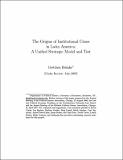| dc.description.abstract |
Institutional instability and inter-branch crises pose a fundamental challenge to democracies in Latin America and the developing world more generally. Combining a standard game theoretic model of crisis bargaining with a unique dataset on the executive, legislative, and judicial branches in eighteen Latin American countries for 1995 to 2005, this article develops a strategic explanation of the origins of inter-branch crises. Descriptive and multivariate analyses support the view that institutional crises in Latin America increase in stakes and expectations of success and decrease as institutional legitimacy rises. This paper also casts doubt on a host of alternative hypotheses, including: the age of democracy, income, and political ideology. |

